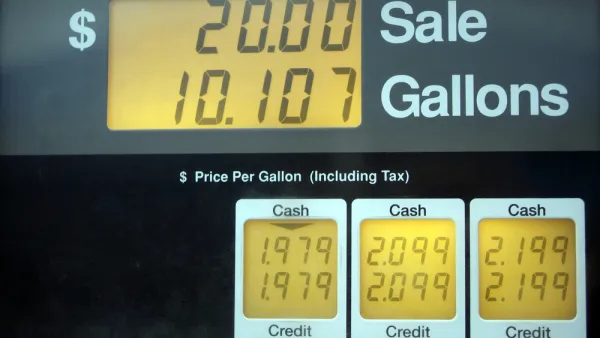An economist from the Tax Foundation spoke to advocates of a mileage-based user fees. First surprise, he calls it a tax, not a fee. He appears to favor the MBUF over the gas tax, but notes its problems.
In late February, the Mileage-Based User Fee Alliance held their second annual conference. Guest speaker: Kyle Pomerleau, an economist for the Tax Foundation’s Center for Federal Tax Policy.
"I was invited to speak on the tax policy and the taxpayer perspective of mileage-based taxes, or sometimes referred to as vehicle miles traveled (VMT) taxes," writes Pomerleau. "This group is interested in how mileage-based taxes could help better fund transportation spending and how it can better 'price' roads than the gas tax."
The basis for the gas tax is the user-pays principle of taxation. This principle states that those who benefit from government spending (in this case roads) should pay for the associated government spending. This “prices” the roads in order to prevent overconsumption (congestion) and makes sure there is sufficient revenue to fund repairs.
Gas tax "underprices" roads
Pomerleau points out the inherent flaw in gas taxes: it's a tax on fuel consumption, not on driving. Furthermore, it isn't adjusted for inflation. Result: it "underprices roads, which leads to an underfunded trust fund and crowded roads."
Inherent problems with VMT Fee (or Tax)
While a mileage based system could raise sustainable revenue and price roads more effectively than the gas tax, there are some possible drawbacks. It requires more administration than the gas tax, people have privacy concerns about their vehicle being tracked, and since it is much more salient compared to the gas tax, there may be more political opposition.
Even if the VMT Fee were a consideration on the federal level (as it is in Oregon and many other states), it's not ready to be implemented any time soon, while the Highway Trust Fund runs out of funding on May 31, notes Pomerleau, who closes his essay by writing, "A more near-term solution needs to be devised that fixes the trust fund, whether it is spending reform, funding reform, or some combination of the two."
In a second, comprehensive piece on the federal gas tax and the Highway Trust Fund, Pomerleau describes the Obama plan that would repatriation tax revenue. "This type of proposal violates a number principles of good government finance, among them, the user-pays principle which states that taxpayers should pay for the government services they use." He goes on to analyze various "Options to Fix the Highway Trust Fund."
FULL STORY: Replacing the Gas Tax with a Mileage-Based Tax

Analysis: Cybertruck Fatality Rate Far Exceeds That of Ford Pinto
The Tesla Cybertruck was recalled seven times last year.

National Parks Layoffs Will Cause Communities to Lose Billions
Thousands of essential park workers were laid off this week, just before the busy spring break season.

Retro-silient?: America’s First “Eco-burb,” The Woodlands Turns 50
A master-planned community north of Houston offers lessons on green infrastructure and resilient design, but falls short of its founder’s lofty affordability and walkability goals.

Test News Post 1
This is a summary

Analysis: Cybertruck Fatality Rate Far Exceeds That of Ford Pinto
The Tesla Cybertruck was recalled seven times last year.

Test News Headline 46
Test for the image on the front page.
Urban Design for Planners 1: Software Tools
This six-course series explores essential urban design concepts using open source software and equips planners with the tools they need to participate fully in the urban design process.
Planning for Universal Design
Learn the tools for implementing Universal Design in planning regulations.
EMC Planning Group, Inc.
Planetizen
Planetizen
Mpact (formerly Rail~Volution)
Great Falls Development Authority, Inc.
HUDs Office of Policy Development and Research
NYU Wagner Graduate School of Public Service


























